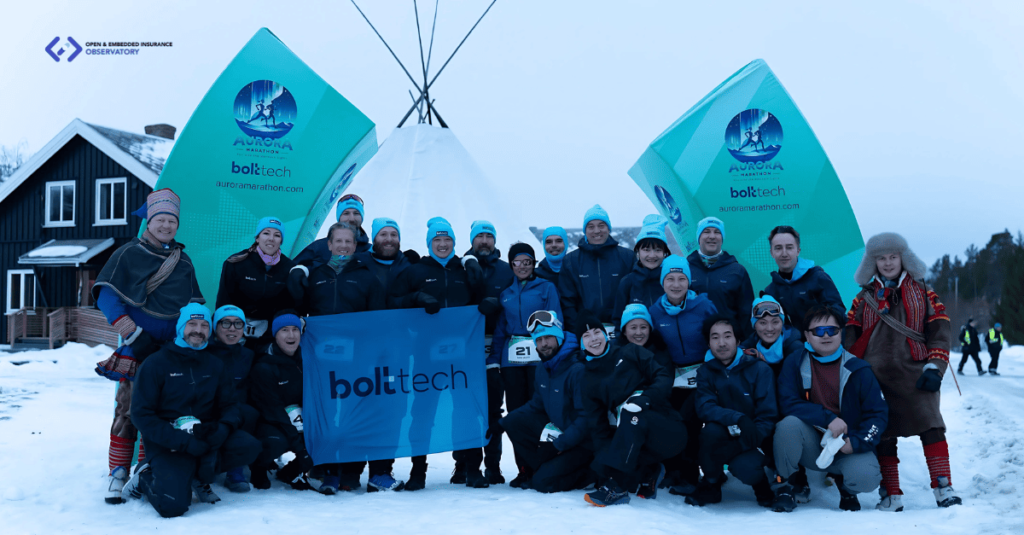bolttech is the fastest growing company on earth in the embedded insurance sector. Founded in 2020 just before the pandemic, it is now active in 37 countries, connected with 230 insurance carriers and quoting over $65 billion gross written premium in the past 12 months.
How did bolttech achieve this? The Open and Embedded Insurance Observatory sat down with Rob Bauer, President and Chief Growth Officer at bolttech, to hear the company’s extraordinary methodology.
Yuri: Hi Rob! bolttech is clearly a phenomenal company. Can we start with the company culture? Your founder Rob Schimek is an ultramarathon athlete, competing in the Iron Man World Championships and Antarctic Marathon. Other leaders to trail running, sailing, kitesurfing and so on. It’s an unusual ethos!
Rob: You’re absolutely right. Working at bolttech is a full contact sport. I joined our CEO and 18 others from our leadership team went to Alta in Norway this winter to run the Aurora Marathon. The course is around vast Finnmarksvidda plateau, with steep ice slopes. It was an amazing bonding experience. A year ago, a group of us did the Antarctic Ice Marathon together in Union Glacier, Antatica.
Fitness for us is a stress relief. But it’s more than that. We take care of ourselves, of each other, and our clients. High energy means high standards. For us it’s about drive and commitment. Our team travels as a pack, literally and figuratively.
Yuri: Another unusual trait is your location. The company HQ is Singapore. You are in San Francisco, the chief financial officer is in London, others all over the globe. Why?
Rob: We were born just before the pandemic, and we came of age in that period. So we are spread all over the world. Our Group CFO is in London, our Group CTO is in Melbourne. We have major operations in Japan, Thailand, Vietnam, Taiwan, the Philippines, Indonesia, Malaysia, in Europe particularly Poland. Our Europe CEO speaks German at home, Japanese to his kids, and English to our clients. Diversity for us is a strength. We want diversity of experience, diversity of thought. It forces us to think differently.
Our ten member executive committee tries to meet once a quarter in-person, so there is a lot of travel involved.
Yuri: Let’s talk about your model. bolttech is a one-stop-shop for embedded insurance. Is each new product made bespoke, or are you using pre-built modules like Lego?
Rob: Lego is exactly the word we use ourselves. We have 220 microservices in our set which we can assemble and build for you. You can use any mixture or quantity. You want to use 18 for a more complex concept? Or just two. All fine.
Take our payment system module for instance. Insurance needs payment to be taken, so customers need a PCI-compliant payments method. We have that built and ready to go. Another module is customer relationship management. We cover everything you need for embedded insurance. Just plug the modules together, via the APIs, and build your idea.
For example, another differentiator is our relationship with Salesforce. We are building directly on Salesforce’s Financial Services Cloud, capturing the benefit of AI to further personalize the quoting experience.
Yuri: You offer access to a long list of carriers. How important is this carrier element of the embedded insurance equation?
Rob: The biggest reason people call bolttech is for our carrier connections. Carrier relationships are difficult to start, and just as difficult to maintain. An area where we excel is our use of data. We make sure information is quickly and accurately conveyed from the carrier through the embedded insurance system. So if a motor insurer offers cover on Opel cars and wants to increase the price for, say, blue Opel electric vehicles in Paris, that information is automatically traded through our platform on a daily basis.
We use AI to watch for errors. For example, if an Opel car model is typically being insured for $600 and suddenly one day quotes are being returned for $60 that will trigger an alarm and our system will fix the error on its own. These are self-healing systems.
One of the reasons people come to bolttech is our scale. We have the size and experience to study, research, and support data-rich connections with carriers, and implement AI self-healing technology. It’s yet another way we distinguish ourselves from other platforms.
Yuri: Do you see bolttech as a tech consultancy?
Rob: No, we are a platform. Half our people come from insurance, half from tech. We need both elements. One of the 6,000 products on our platform is device protection. For example, we are Samsung Care in 14 markets. It is our white labelled service. If a phone has a cracked screen or has water damage, we cover it. We make it work, in part, because of our data analytics and deep industry knowledge. We can remotely predict the cost – including frequency and severity – of screens cracking. And we know the best methods to repair those screens in 14 markets. That’s not something a rival would find it easy to replicate.
A big part of our growth story is our tech expertise. When we help to insure motor vehicles, our system can take driving data directly from vehicles. When we insure houses, we ingest water leak sensor activity, so the underwriter can better hone their risk selection. The difference between us and other platforms is this focus on data and technology. Underwriters appreciate that a connection with bolttech can help them not only on their top-line, but also their bottom-line profitability targets.
Yuri: How are you maximising the impact of AI?
Rob: I’ve been around a while and have lived through multiple eras of new tech arriving. I saw the blockchain revolution first hand. When I was at AIG we created the first insurance policy on blockchain. When I was at Marsh, we created the first autonomous vehicle insurance policy. AI is different and more profound. It’s hard to overestimate the impact AI will have on insurance underwriting and distribution.
Some see AI as a condiment. Sprinkle a bit on top of and it’ll make things taste better! That is not our approach. We have sewn AI into the fabric of our company since the start.
Our AI gives us incredible insights. From a distributor standpoint, it can answer vital questions. How are you connected to your customers? How often do things break? And what breaks the most often? How complete is the coverage you offer, and how can it be improved? We bring the collective intelligence of 700 distribution partners and 230 carriers.
The large language models AI is build on are all about scale. And because we are one of the biggest platforms in the embedded insurance world we bring more scale to the equation than anyone else.
Yuri: Some companies struggle to hire the best tech workers. Especially in AI. How are you finding recruitment?
Rob: Every company has that challenge. Again, we believe recruitment is another area where we differentiate. Our global, digital first culture means we attract leaders from the best companies in the world. We have extraordinary people from digital banks in Asia, and other outstanding tech companies like Salesforce. We make it easy for people to work wherever they are in the world. Our HQ is in Singapore which is several timezones ahead, so in that way relative to those of us waking up in Europe or Silicon Valley our company literally lives in the future! And that’s what you find here, an attitude that we are inventing the future. If you offer candidates that experience, you create something they want to be a part of.
Yuri: To what degree is having an HQ in Singapore a part of your success?
Rob: We are global, but you are right, we are based in Singapore and it’s a big deal for us. The state fund of Singapore is one of our investors, and we like to think that when the national sovereign wealth fund backs you, you are doing something right.
Singapore and Asia in general is world leading in fintech, insurtech, and digital-first thinking in general. Part of our superpower is to be planted in Singapore.
There is a book which summarizes what it’s like to build a tech company in Asia: “AI Superpowers” by Kai-Fu Lee. The author was an early employee at Google in the region, and then at Apple. He went on to lead his own innovation fund. If you want to find another hour in your day, another gear on your bike, and push harder, read it. It’s inspiring.
Yuri: One of your board members is Malcolm Turnbull, prime minister of Australia 2015 to 2018. What is he like?
Rob: He’s an amazing guy. He had a super career as a statesman and an entrepreneur. I am lucky to talk with him, at least on a quarterly basis – often about climate change and the ways insurance can be a societal shock absorber. He does a podcast now called Defending Democracy, which I can absolutely recommend. He brings a huge amount of experience. He was classmates with Theresa May at Oxford University years ago, had a great career in venture capital. He’s invaluable for the guidance and vision he brings to our company.
Yuri: Finally, what is the mission at bolttech?
Rob: We want to close the protection gap. Swiss Re publish their Sigma report every year. Last year they estimated the protection gap at $1.8 trillion. The gap between insured and the need for insurance keeps growing – it was $1.4 trillion when we started the company. Risks keep increasing. The answer to closing that gap is affordability, more reliability, more custom made products, all of which are enabled by our system.
Yuri: Fantastic. Thanks Rob!
Rob: My pleasure!


